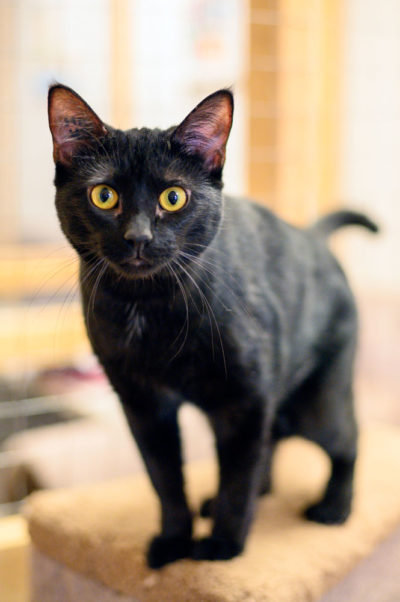Increased funding for Happy Cat Sanctuary
By Sean Feagan, Local Journalism Initiative Reporter

Sean Feagan Photo
Strathmore town council voted to approve funding to Happy Cat Sanctuary, a move that could raise taxes slightly, but also save taxpayers funding in the long run.
In 2018, the organization received a three-year funding agreement with the Town of Strathmore paying it $22,000 in 2018 (starting May 1), $33,000 in both 2019 and 2020, and $11,000 in 2021. This year’s funding to March 31 is already approved in the town’s 2021 budget.
But with this agreement ending at the end of the month, the Happy Cat Sanctuary Society requested town council approve a three-year funding extension on March 17.
Happy Cat Sanctuary requested $33,000 per year in operational funding and an additional $15,000 per year to fund 50 per cent of a paid administrative position. As $11,000 had already been approved under the town’s 2021 budget, this would have equated to $38,000 in new funding.
With the town’s budget set and a commitment to no tax increase this year, there was some hesitation on council of approving the funding request.
“What I’m struggling with is that in this climate right now, I don’t know if I can justify those numbers again to our ratepayers,” said Councillor Lorraine Bauer.
Feral cats were once a problem in Strathmore, resulting in problems and expenses for residents, municipal enforcement and veterinarians. But 18 years ago, Barb Stefanich and Michele Shave started the Happy Cats Sanctuary to begin offering programs to address this issue.
The organization works to rescue and rehome cats. But it also runs a trap, neuter and release program for feral strays, and a surrender program giving owners an option to find their pet a new home.
Thanks to the sanctuary’s work, the town is now almost free of feral cats, said Stefanich. But without securing funding, the organization could be forced to close. Then feral cat populations would likely increase, costing residents and municipal enforcement time and money.
As a result, approving the funding could be the cheaper option to ratepayers long-term, said Councillor Denise Peterson, who added that a past bylaw manager estimated the sanctuary saves the town around $50,000 per year.
“If they have to walk away, what is that going to cost us?” she asked.
Happy Cat Sanctuary helps cats beyond those in Strathmore. Over the past three years, the sanctuary has rescued 607 cats, including about 221 coming from inside town limits. The other cats were from neighbouring municipalities, including Wheatland County and Rocky View County, Chestermere and Calgary, and sometimes beyond. A total of 433 cats have been adopted into new homes.
But Happy Cat Sanctuary does not receive funding from these other municipalities. On March 2, Wheatland County council declined a request for funding by the organization.
“They flatly turned us down for any funding,” said Stefanich.
Councillor Jason Montgomery asked if the shelter could start taking in only cats from Strathmore. But Stefanich said this would likely decrease the amount of donations the shelter receives.
“I think that would destroy our donation base and sort of destroy our rescue,” she said. “They’ve supported us because we’ve supported them.”
The sanctuary typically gains revenue by holding a casino night, but this has not been possible because of the COVID-19 pandemic.
Veterinarians also benefit from the Happy Cat Sanctuary, as they otherwise bear the burden of helping stray and injured cats. Three veterinarians in town and one in Calgary provided letters of support for the organization. Since the sanctuary started, the number of stray and abandoned cats brought to veterinary clinics has “decreased dramatically,” wrote Karen Sevick, veterinarian at Sevick Veterinary Services Ltd.
All three vet clinics in the area offer Happy Cat Sanctuary at-cost veterinary services.
“They realize how much money that we are saving them,” said Shave.
If the sanctuary were to close, fewer residents would benefit from engaging in volunteering experiences there. Volunteers contribute over 4,700 hours per year in a variety of roles for the shelter, equaling about $77,550 in wages at minimum wage. Several residents, as well as FAIM, a local non-profit helping people with developmental disabilities, provided letters of support regarding the value of volunteering at the sanctuary.
“A lot of people have dedicated a lot of time and they’re proud of what they accomplished in Strathmore, said Shave. “They actually see the difference it’s making, and not just in cat’s lives, but in people’s lives as well.”
A motion to approve the organization’s three-year funding ask failed 3-3, with Councillors Tari Cockx, Bauer and Montgomery voting in opposition. Councillor Melanie Corbiell was not in attendance at the meeting.
However, Montgomery then proposed a new motion, to approve one-year funding of $36,500, equating to the $33,000 approved in 2018 and 2019, plus a 2.5 per cent increase. This represents $25,500 in new funding. The motion passed 4-2, with Cockx and Bauer again voting in opposition.
The approved funding could result in a slight increase to the town’s tax rate, explained CAO Doug Lagore. However, this will be known only once the town knows its exact tax assessment amount and finalizes its mill rate bylaw later this year. Lagore recommended council reexamine the issue in the fall, to determine how the town might support the organization into the future.
